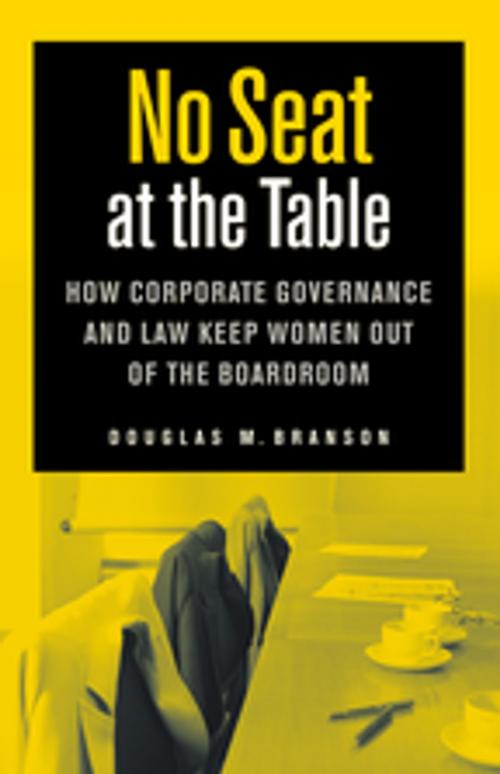No Seat at the Table
How Corporate Governance and Law Keep Women Out of the Boardroom
Nonfiction, Reference & Language, Law, Gender & the Law, Corporate| Author: | Douglas M. Branson | ISBN: | 9780814789643 |
| Publisher: | NYU Press | Publication: | December 1, 2006 |
| Imprint: | NYU Press | Language: | English |
| Author: | Douglas M. Branson |
| ISBN: | 9780814789643 |
| Publisher: | NYU Press |
| Publication: | December 1, 2006 |
| Imprint: | NYU Press |
| Language: | English |
Women are completing MBA and Law degrees in record high numbers, but their struggle to attain director positions in corporate America continues. Although explanations for this disconnect abound, neither career counselors nor scholars have paid enough attention to the role that corporate governance plays in maintaining the gender gap in America's executive quarters.
Mining corporate governance models applied at Fortune 500 companies, hundreds of Title VII discrimination cases, and proxy statements, Douglas M. Branson suggests that women have been ill-advised by experts, who tend to teach females how to act like their male, executive counterparts. Instead, women who aspire to the boardroom should focus on the decision-making processes nominating committees—usually dominated by white men—employ when voting on membership.
Filled with real-life cases, No Seat at the Table opens the closed doors of the boardroom and reveals the dynamics of the corporate governance process and the double standards that often characterize it. Based on empirical evidence, Branson concludes that women have to follow different paths than men in order to gain CEO status, and as such, encourages women to make flexible, conscious, and often frequent shifts in their professional behaviors and work ethics as they climb the corporate ladder.
Women are completing MBA and Law degrees in record high numbers, but their struggle to attain director positions in corporate America continues. Although explanations for this disconnect abound, neither career counselors nor scholars have paid enough attention to the role that corporate governance plays in maintaining the gender gap in America's executive quarters.
Mining corporate governance models applied at Fortune 500 companies, hundreds of Title VII discrimination cases, and proxy statements, Douglas M. Branson suggests that women have been ill-advised by experts, who tend to teach females how to act like their male, executive counterparts. Instead, women who aspire to the boardroom should focus on the decision-making processes nominating committees—usually dominated by white men—employ when voting on membership.
Filled with real-life cases, No Seat at the Table opens the closed doors of the boardroom and reveals the dynamics of the corporate governance process and the double standards that often characterize it. Based on empirical evidence, Branson concludes that women have to follow different paths than men in order to gain CEO status, and as such, encourages women to make flexible, conscious, and often frequent shifts in their professional behaviors and work ethics as they climb the corporate ladder.















